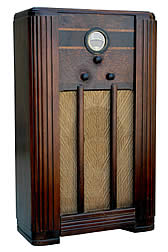
Whatever its size, the radio occupied a prominent place in the parlor, where the family would gather around and LOOK at it as they listened.


Whatever its size, the radio occupied a prominent place in the parlor, where the family would gather around and LOOK at it as they listened.
In another article we wrote of 14-year-old Robert Parati writing to WBT in 1941 for a free picture of the Lone Ranger. Actually that's only a small part of the story.
Young Bob was also a fan of WBT's "Aunt Sally," a live Saturday morning program of children's stories which followed the CBS classic "Let's Pretend."
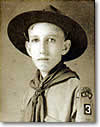 |
| Boy Scout Bob Parati went to the broadcast and won a cake. Photo courtesy Bob Parati. |
In 1941 Bob was in a Boy Scout troop with another youngster named Fred Powell. It just so happened that Fred was the son of the lady who played Aunt Sally, Mrs. Pasco Powell. On one particular Saturday their scout troop was allowed to visit the Wilder Building studio during Aunt Sally's program to celebrate a very special occasion: the Lone Ranger's birthday.
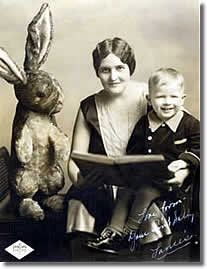 |
| An Aunt Sally promotional photo. About 1928. Courtesy Jim Scancarelli. |
What could possibly have sparked Aunt Sally's producers' interest in the age of the masked rider of the plains? Funny you should ask. The sponsor of Aunt Sally's program, you see, was Merita Bakeries, which also sponsored the Lone Ranger.
Anyway, during the broadcast the scout troop enjoyed slices of cake (Merita, of course), and then a contest was held. Each of the scouts took their turn at the microphone and yelled "Hi-yo, Silver, awaaaay." The judges concluded that the most convincing and authentic rendition of the masked man's cry was done by none other than....Bob Parati! The prize? Another Merita cake, to take home, this one chocolate.
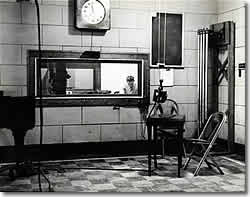 |
| Bob Parati believes this is the WBT studio where the broadcast occurred that day in 1941. Photo courtesy Jim Scancarelli. |
The Lone Ranger himself was not present at the party, nor was Tonto. (There probably were outlaws somewhere that needed apprehending.) Bob remembers very clearly that the age of the Lone Ranger was not revealed. Likely not out of some plan of malicious concealment, but because...well, because it's best that some things are left alone.
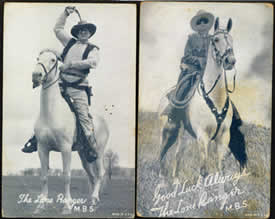 |
| Earl Graser (left) and Brace Beemer, the principal radio actors who portrayed the Lone Ranger. Before Graser was killed, Beemer would often play the Ranger in personal appearances because, physically, he was better suited for the role. Courtesy Jim Scancarelli. |
An interesting footnote about the radio cast: Earl Graser assumed the role of The Lone Ranger in 1933. Over the next eight years, his voice became as familiar to young kids as their own father's. But in April of 1941 Graser was killed in an automobile accident. Legend has it that the children of America went into shock, thinking the character, not the actor, was dead. In order to buy time for the producers to find a suitable replacement, the scriptwriters devised a plot line in which the hero was badly injured, and, for several episodes he only emitted groans and grunts, thus assuring the kiddies that the LR was still alive. Then, just as the masked man came out of his coma and was able to speak, an announcer who had sometimes been the narrator of the show, Brace Beemer, stepped into the revered boots, and became the character for 13 years, until the series came to an end. History does not record whether the children noticed that the 'new' Lone Ranger sounded different from the old.
As for Bob Parati, time has erased any memory he might have had of Earl Graser. To him, Brace Beemer was always the Lone Ranger.
Many years later, a much older Bob Parati learned that Clayton Moore, the TV ranger, was appearing in Charlotte at a nearby shopping center. Bob left work to go meet and chat with the costumed actor. After he said hello Bob turned to walk away. Moore called his name and tossed him—are you sitting down?—a silver bullet. Well, a silver-looking bullet.
Incidentally, in publications meant for Spanish-speaking countries, The Lone Ranger is translated as El Llanero Solitario (the Lone Plainsman). And, because in Spanish the word 'tonto' means 'stupid,' the Indian companion is called something innocuous like Pepe, or Pupu.